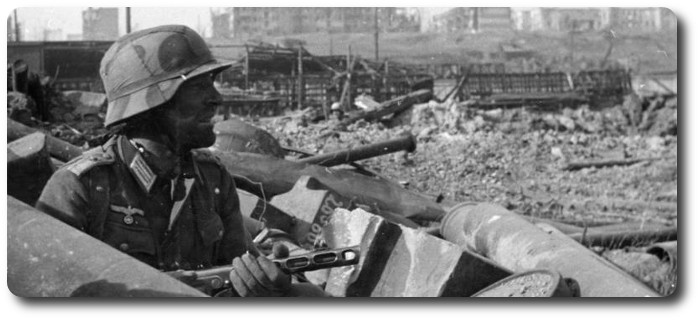Topic: The Field of Battle

October 1942: German officer with a Russian PPSh-41 submachine gun in Barrikady factory rubble. Many German soldiers took up Russian weapons when found, as they were more effective than their own in close quarter combat. "Bundesarchiv Bild 116-168-618, Russland, Kampf um Stalingrad, Soldat mit MPi" by Bundesarchiv, Bild 116-168-618 / CC-BY-SA. Licensed under CC BY-SA 3.0 de via Wikimedia Commons.
Encirclement
War on the Eastern Front 1941-1945; The German Soldier in Russia, James Lucas, 1979
Indeed the participation of very senior commanders became a feature of such operations and at Stalingrad it was accepted that general and field officers would take up machine pistols or rifles and act as infantry soldiers once their own commands had been destroyed or amalgamated.
… guidelines drawn up by the German Army for units which were encircled.
Three types of situation were catered for: the one where encircled troops stayed in position until a relieving force rescued them; the second, where they undertook a break out operation using just their own forces, or, thirdly, where the whole encircled body rolled, as a sort of mobile pocket, through enemy lines to regain their own main force.
The tactics governing each of these types of operation differed but two tenets were fundamental to each; firstly the maintenance of morale and the second a strong command. Taking morale first: the Germans appreciated that men surrounded by enemy forces are subject to neurosis, a so-called Kesselfieber (encirclement fever), wherein are exhibited the two great fears of beleaguered garrisons. These are the loss of links with home and medical treatment or evacuation of the wounded. The question of adequate food supplies was found to be of a less concern than that of ammunition. Thus, the successful pocket was one which had an air strip on to which planes could land with supplies, fresh troops, ammunition and mail and from which wounded could be evacuated to the main line. Failing an air strip regular and frequent air drops, especially where the supplies included little luxuries, maintained morale at a high pitch. Propaganda was another important factor and the realisation that Red Army men deserted to encircled German troops helped to maintain the spirits of the invested army. Particularly was their morale high if they could know that their defence was causing the enemy huge losses and that its morale was suffering as a result. The bringing in, wherever possible, of fallen German dead and their formal interment was in direct contrast to the heaps of fallen Russian whom their comrades did not bother to remove and bury. Then, too, the growing mounds of Soviet dead were a reminder of how successful was the defence.
Strong command was vital and, depending upon the size of the pocket, the commanding general had a number of staffs directly responsible to him for various services within the invested area. Also, it was important, indeed essential, that the ordinary soldier should be aware that the staff and the senior commanders were undergoing the same privations that he himself was expected to bear. The presence of the senior commander in the front line had to be a common occurrence. Indeed the participation of very senior commanders became a feature of such operations and at Stalingrad it was accepted that general and field officers would take up machine pistols or rifles and act as infantry soldiers once their own commands had been destroyed or amalgamated.

